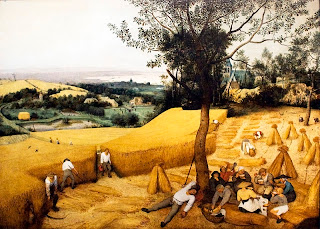 |
| Pieter Bruegel the Elder. The Harvest. 1565. |
Quite a few years ago, my young classmates and I were enthralled by the story of the first Thanksgiving. Plymouth, Massachusetts, seemed remote and exotic; we envisioned Plymouth Rock as an enormous, looming protuberance, much like the Rock of Gibraltar. It turns out that the rock is actually quite small, but it remains a stirring monument to the intense faith and hard labors of the Mayflower Pilgrims.
The colonists had originally intended to depart Europe in early
1620 to give them at least a partial growing season in the New World. But that was not to be. After many delays and
false starts, the Mayflower finally left
Plymouth, England, on September 6.
Inclement weather, unfavorable winds, and turbulent seas extended the grueling
journey to over three and a half months. Finally, on December 21, the
first landing party came ashore at New Plymouth, and several days later the
construction of a common house was begun.
Winter is not the easiest time to establish a colony. In the harsh, frozen land they hoped to claim,
nearly half of the original 102 Mayflower
passengers perished by spring. Husbanding the meager provisions remaining on the Mayflower, hunting in the surrounding lands, and fishing the sea, fifty
three of the colonists managed to survive.
Now the challenge was to clear land, plant crops, and pray for a favorable
harvest.
It turns out that they were lucky, or blessed, or both. The soil was rich, weather gentle, and crops
grew vigorously. The harvest was plentiful
and, with salted cod, smoked venison, and other provisions stored in plentitude,
the odds of surviving the coming winter appeared good. The Pilgrims celebrated a harvest festival
along with a band of Massasoits with whom they had a treaty of peace. It is quaint to think so today, and perhaps
even illegal in our public schools, but they gave deep, heartfelt thanks to God
for their good fortune.
We have become very disconnected from the sources of our food. By and large, unlike the Pilgrims, we don’t
have personal involvement in planting and harvesting the food that we eat. Potatoes grow in hills of soil and were harvested with flat-tined pitchforks in the fall. Corn and pumpkins were planted together
because the pumpkin plants smothered weeds and helped to retain moisture for the corn. All this the Pilgrims knew; we know how to
drive to the grocery store.
So this Thanksgiving, while we are giving thanks for the
Black Friday shopping binge to come, please give a thought to our blessings, the hard working
farmers who labor for us, their bountiful harvest, and how very fortunate we are.

No comments:
Post a Comment